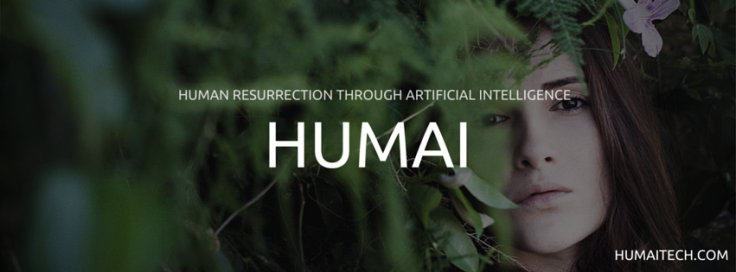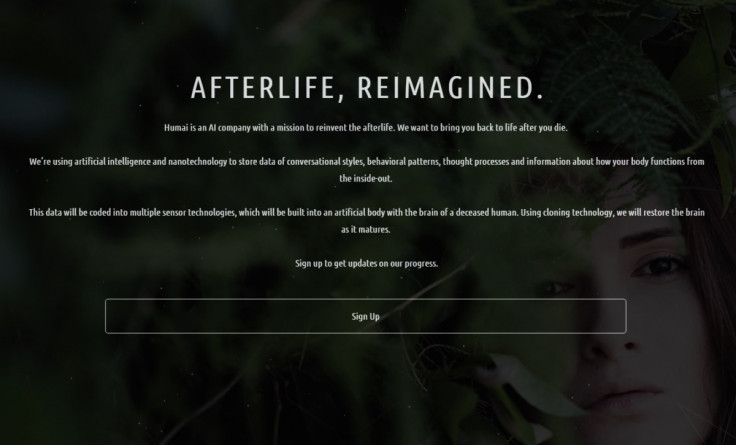Humai wants to resurrect the dead with AI, cloning and nanotechnology – but is it real?

A US entrepreneur says he is going to resurrect the dead and achieve everlasting life using artificial intelligence, nanotechnology and cloning. Josh Bocanegra, founder and CEO of Humai, said he wants to resurrect the first human by 2045. The only problem - it doesn't seem to be a real company.
IBTimes UK contacted Bocanegra for clarification about Humai and he said it is indeed genuine. "Humai has been a project I've been working on years before LoveRoom [a website he launched in 2013]. It's what I've always been passionate about but wasn't ready to make our mission public until now. If some believe what we're doing is fake, that's not my business. We're dedicated to this project, we're doing our best and we're taking one step at a time."
So why the doubt? There are a number of red flags, but before looking into this, here are the basics of what Bocanegra is proposing:
Everlasting life
Details on exactly how everlasting life would be achieved are scant, but essentially rely on technology and science that does not yet exist. "Humai is an AI company with a mission to reinvent the afterlife," its mission statement states. "We want to bring you back to life after you die. We're using artificial intelligence and nanotechnology to store data of conversational styles, behavioural patterns, thought processes and information about how your body functions from the inside-out.
"This data will be coded into multiple sensor technologies, which will be built into an artificial body with the brain of a deceased human. Using cloning technology, we will restore the brain as it matures."
Humai is reinventing the afterlife. https://t.co/a67jWDvlPM pic.twitter.com/JXDJ7n9ijf
— Humai (@HumaiTech) October 30, 2015Confused? In an interview with Popular Science, Bocanegra sort of elaborated, saying they will collect the data they need on members for years before they die via "various apps we're developing". They will then freeze the person's brain using cryogenics (the only part of the plan that is really feasible).
Bocanegra said that after the brain is frozen – and the technology is "fully developed" - they will implant it into an artificial body that will be controlled by thoughts. Nanotechnology will then be used to repair and improve cells in the ageing brain. "Cloning technology is going to help with this too," he added.
Is it real?

So far Humai has a website, a Facebook page, a Twitter account, an email address and several media reports. But that's about it. The company's Twitter account was set up on 30 October with the first tweet: "In the beginning, Humai was born." There are then lots of hashtags about AI, startups, nanotech etc. Pictures of Bocanegra overlaid with quotable quotes are also shared. "I accept death, I'm not afraid of it. But I'm not 100% sure I'm going to die one day" one reads.
In the interview with Popular Science, Bocanegra claims he currently has five people working on it – one focusing on the AI, two researchers working on AI, nanotech, bionics and sensors, an ambassador to teach people about the mission and himself. He says he has only put his own money into the company but will be looking for further investment at a later date.
Will death always be inevitable? We don't think so. https://t.co/a67jWDvlPM pic.twitter.com/Q8O9vLdmL2
— Humai (@HumaiTech) November 15, 2015#Science has a #marketing problem. https://t.co/a67jWDvlPM pic.twitter.com/QEWPdC1QnS
— Humai (@HumaiTech) November 18, 2015But who is Bocanegra? He is a writer at Elite Daily and Atheist Republic and according to his personal website, is a "serial entrepreneur, technology visionary and internet marketer". In a short film about himself he asks "how can you, I, our friends and children really trust that what we see on the TV and hear on the radio is true?" The answer ... holding a picture of Bocanegra, an actress says: "We can thank this person for giving us new perspectives. We can thank this person for giving us a choice. This person gives us an alternative to uniformity and short-term thinking ..."
Further to this, Bocanegra has a record of setting up what appear to be fake companies, tricking people and fooling the media.
LoveRoom

Bocanegra is behind LoveRoom, a dating website idea that caused a stir in the media in 2013. The idea was an Airbnb for dating where you could rent your room to "attractive people". He launched a landing page for the fake app but ended up getting 900 email addresses and widespread press coverage.
Forbes later debunked the site as a fake and said it had been "willed into existence by journalists". Bocanegra agreed, telling the Observer: "LoveRoom was a thought experiment and it was also a marketing experiment. I wanted to see if people would talk about it and if people would use it." He later said giving the amount of attention it got he was thinking about making Love Room a reality and did just that. "LoveRoom is real. We have over 16,000 users and the site was only a landing page for a few weeks," he said.
Janiene Fuentes (according to Linkedin) is the co-founder and marketing VP of LoveRoom. She is also a researcher at Humai.
Anything else?
Not really.
Actual everlasting life?

While Humai might not be real, the widespread attention it got raises the idea of the search for everlasting life and the idea of living on after death through AI and scientific breakthroughs.
There are now several websites that allow you to have an online presence after death. For example, Heavenote allows people to send texts, photos and video messages to people after death. Indeed, this idea was highlighted in an episode of Charlie Brooker's Dark Mirror where a woman receives messages from her dead partner until it all goes a bit far.
Scientifically, there is an increasing interest in cryogenic freezing, with a number of celebrities and wealthy people expressing interest in having their bodies frozen just before death in the hope of being bought back to life at a later date. In October, a two-year-old girl from Bangkok became the youngest person to be cryogenically frozen after suffering from a rare form of brain cancer. Her parents (who also plan to have themselves frozen) said they may have given their daughter another chance at life. Whether cryogenic freezing will lead to resurrection and eternal life remains to be seen.
Another even less likely way of achieving immortality is head transplantation. Italian neuroscientist Sergio Canavero controversially announced plans to perform the world's first human head transplant. In an interview with Italian website LaPresse.it, he said: "We are one step closer to extend life indefinitely because when I will be able to give a new body to an 80-year-old they could live for another 40 years." Theoretically this may be true, but the chances of a successful head transplant are very low, most scientists have said.
So the quest for immortality goes on.
© Copyright IBTimes 2025. All rights reserved.






















